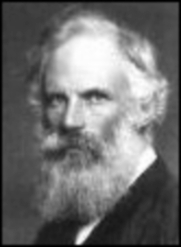- FITZGERALD
- IRELAND (see also List of Individuals)\
 3.8.1851 Dublin/IE - 22.2.1901 Dublin/IE\George Francis FitzGerald entered at the age of 16 Trinity College in Dublin and in 1871 graduated in both mathematics and experimental science. Then he studied the classic works of Joseph Louis Lagrange (1736-1813), Pierre Simon Laplace (1749-1827) and his countrymen Hamilton and MacCullagh. The Electricity and magnetism work of James Clerk Maxwell (1831-1879) had a great impact on his further research. In 1877 FitzGerald finally won the fellowship for the Trinity College in Dublin, where he was attached to the Department of Experimental Physics. He was appointed professor of natural philosophy at the Erasmus Smith Chair in 1881 and increased significantly the teaching of experimental physics. From 1888 he was an examiner in physics at the University of London and served from 1898 as a Commissioner the national education in Ireland and traveled to the USA as a part of this task. He was awarded a Royal Medal in 1900 by the Royal Society for his researches in optics and in electricity. FitzGerald died at an age of only fifty due to indigestion.\Today FitzGerald is known for the FitzGerald-Lorentz contraction in the relativity theory. He also added considerably to the understanding of the speed of light. In hydrodynamics, FitzGerald contributed in the 1870s several reports submitted to the British Association for the Advancement of Science. In one paper he presented a theory on the support of spherical drops. In another report he discussed the effect of surface tension in hydrodynamics. In still another paper he investigated the maximum surface tension of vapors near curved liquid surfaces. FitzGerald was also interested in the early developments of aviation; he was a Member of the Aeronautical Society of Great Britain and later a Council Member. He published two papers in its Aeronautical Journal relating to experimental soaring, and to sailing birds.\Bork, A.M. (1972). Fitzgerald, George Francis. Dictionary of scientific biography 5: 15-16. FitzGerald, G. (1878). On the maximum tension of vapours near curved liquid surfaces. Proc. Royal Society Dublin 2: 243-245.FitzGerald, G. (1889). On an electromagnetic interpretation of turbulent liquid motion. Nature40(May 9): 32-34.Fitzgerald, G.F. (1901). On a hydrodynamical hypothesis as to electromagnetic action. Proc. Dublin Royal Society 9: 50-54.Larmor, J. (1902). The scientific writings of the late George Francis FitzGerald. Dublin. PLodge, O.J. (1901). George F. FitzGerald. Obituary Notices Royal Society London 75: 152-160.
3.8.1851 Dublin/IE - 22.2.1901 Dublin/IE\George Francis FitzGerald entered at the age of 16 Trinity College in Dublin and in 1871 graduated in both mathematics and experimental science. Then he studied the classic works of Joseph Louis Lagrange (1736-1813), Pierre Simon Laplace (1749-1827) and his countrymen Hamilton and MacCullagh. The Electricity and magnetism work of James Clerk Maxwell (1831-1879) had a great impact on his further research. In 1877 FitzGerald finally won the fellowship for the Trinity College in Dublin, where he was attached to the Department of Experimental Physics. He was appointed professor of natural philosophy at the Erasmus Smith Chair in 1881 and increased significantly the teaching of experimental physics. From 1888 he was an examiner in physics at the University of London and served from 1898 as a Commissioner the national education in Ireland and traveled to the USA as a part of this task. He was awarded a Royal Medal in 1900 by the Royal Society for his researches in optics and in electricity. FitzGerald died at an age of only fifty due to indigestion.\Today FitzGerald is known for the FitzGerald-Lorentz contraction in the relativity theory. He also added considerably to the understanding of the speed of light. In hydrodynamics, FitzGerald contributed in the 1870s several reports submitted to the British Association for the Advancement of Science. In one paper he presented a theory on the support of spherical drops. In another report he discussed the effect of surface tension in hydrodynamics. In still another paper he investigated the maximum surface tension of vapors near curved liquid surfaces. FitzGerald was also interested in the early developments of aviation; he was a Member of the Aeronautical Society of Great Britain and later a Council Member. He published two papers in its Aeronautical Journal relating to experimental soaring, and to sailing birds.\Bork, A.M. (1972). Fitzgerald, George Francis. Dictionary of scientific biography 5: 15-16. FitzGerald, G. (1878). On the maximum tension of vapours near curved liquid surfaces. Proc. Royal Society Dublin 2: 243-245.FitzGerald, G. (1889). On an electromagnetic interpretation of turbulent liquid motion. Nature40(May 9): 32-34.Fitzgerald, G.F. (1901). On a hydrodynamical hypothesis as to electromagnetic action. Proc. Dublin Royal Society 9: 50-54.Larmor, J. (1902). The scientific writings of the late George Francis FitzGerald. Dublin. PLodge, O.J. (1901). George F. FitzGerald. Obituary Notices Royal Society London 75: 152-160.
Hydraulicians in Europe 1800-2000 . 2013.
